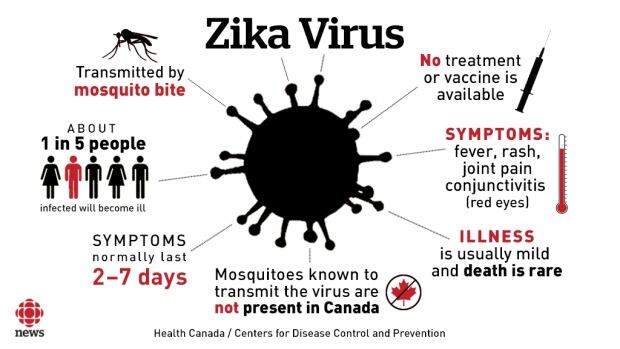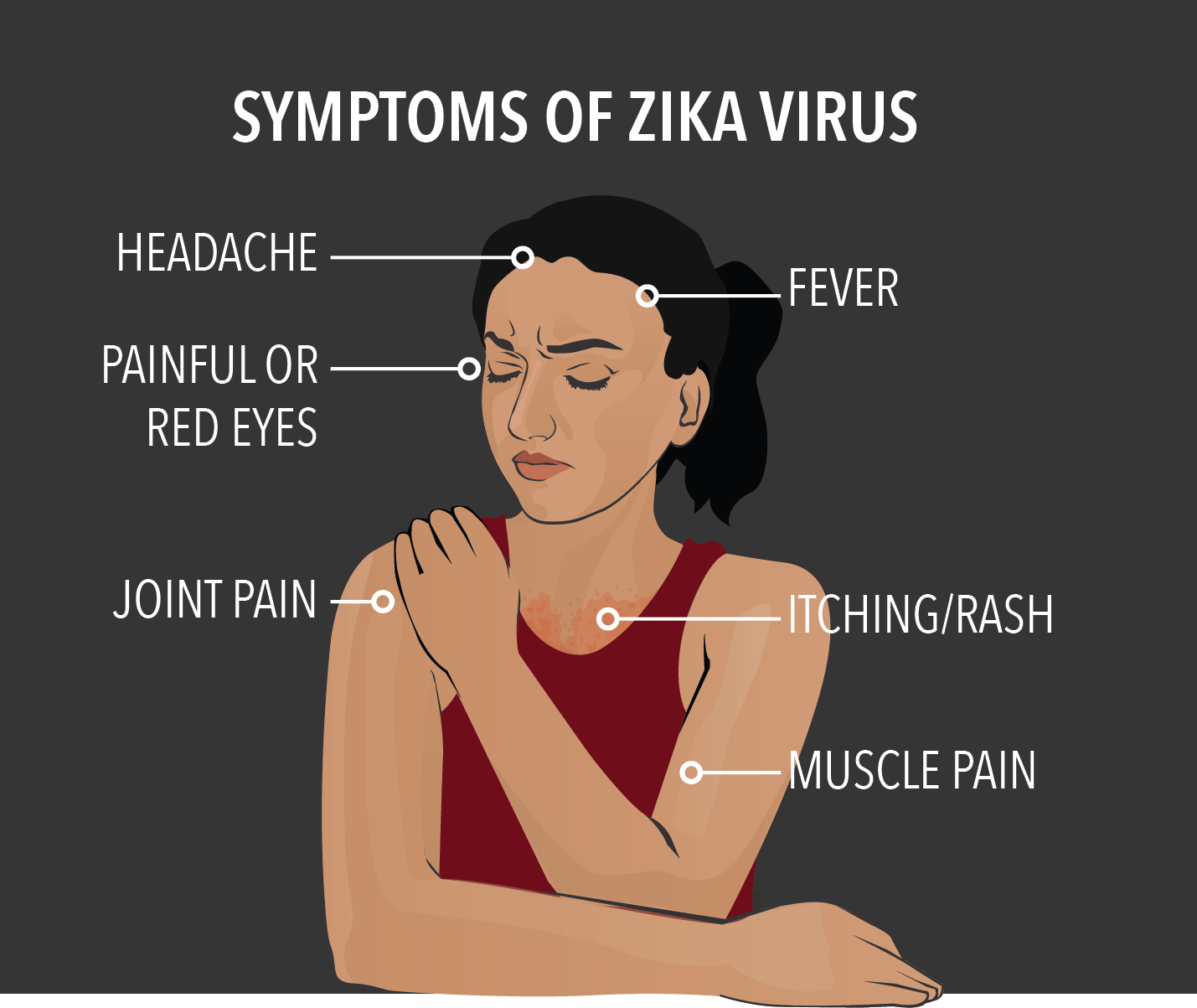~~~~~~~~~~~~~~~~~~~~~~~~~~~~~~~~~~~~~~
 Daily Mail - The Zika virus can cause serious brain infections in adults, French scientists warned today. The mosquito-borne virus has already been linked to brain damage in babies, largely through a birth defect call microcephaly. Babies with the condition have abnormally small heads, and underdeveloped brains.
Daily Mail - The Zika virus can cause serious brain infections in adults, French scientists warned today. The mosquito-borne virus has already been linked to brain damage in babies, largely through a birth defect call microcephaly. Babies with the condition have abnormally small heads, and underdeveloped brains.
But until now, no effects on adult brains had been associated with the fast-spreading virus. However, researchers revealed Zika has been found to cause adults to develop a brain infection called meningoencephalitis.
Continue reading and see illustrations and more information about Zika and related diseases and anomalies
The infection involves inflammation of the brain and the tissue that covers the brain. The discovery was made after the Zika virus was found in the spinal fluid of an 81-year-old man.
The patient had been admitted to a Paris hospital shortly after returning from a month-long cruise - at which point he was semi-comatose, with a high fever and partial paralysis.
Dr Guillaume Carteaux, of the Assistance Publique–Hôpitaux de Paris, told AFP: 'It is the first case of its kind to be reported, to our knowledge.'
The mere presence of Zika in the man's system doesn't prove that the virus causes the infection. Yet, Dr Carteaux said that 'other infectious causes, either viral or bacterial, have been ruled out.'
The team of researchers wrote in the New England Journal of Medicine that the man had been in good health before his four-week cruise, which made stops in New Zealand, New Caledonia, Vanuato and the Solomon Islands.
Of the cruise stops, only New Caledonia is on the Centers for Disease Control and Prevention's (CDC) list of places with Zika outbreaks.
The country was added on Wednesday to the CDC's Zika travel advisory - which has more than 30 destinations, mostly in Latin America or the Caribbean.
The researchers wrote: 'Clinicians should be aware that [Zika virus] may be associated with meningoencephalitis.'
WHAT IS MENINGOENCEPHALITIS?
WHAT IS MENINGOENCEPHALITIS?
- The meninges are the layers of thin tissue that cover the brain.
- If these tissues become infected, it’s called meningitis.
- When the brain becomes inflamed or infected, the problem is called encephalitis.
- But if both the meninges and the brain are involved, the condition is called meningoencephalitis.
- Symptoms of meningoencephalitis include:
- Headache
- Fever
- Neck stiffness
- Sensitivity to light
- Seizures
- Trouble thinking clearly
- Personality changes
- Unusual behaviors Unconsciousness
Source: Johns Hopkins University
EVEN MORE DISEASES CAUSED BY ZIKA
Just one day before the report was published, another team of French researchers linked Zika to myelitis, an inflammation of the spinal cord.
Myelitis affects limb movement and causes paralysis by blocking communication between the spinal cord and body.
A 15-year-old girl had been diagnosed with acute myelitis in January on the French Caribbean island of Guadaloupe. She was found to have high levels of Zika in her cerebrospinal fluid, urine and blood.
There is currently no treatment or vaccine for the Zika virus.
Zika typically only causes mild symptoms in adults - such as low fever, headaches and joint pain.
But the quick spread of the virus has raised global health alarms because of an obseved association with microcephaly and Guillain-Barre, a rare condition in which the body's immune system attacks the part of the nervous system that controls muscle strength.
Brazil has been hit hardest by the outbreak - with nearly 1.5 million affected and 745 confirmed cases of microcephaly in babies born to women infected with the virus.
The World Health Organization said 41 countries or territories have reported Zika transmissions within their borders since last year. Additionally, nine countries have reported an increase in Guillain-Barre cases.
The rise in microcephaly cases and other birth defects so far has 'only been reported in Brazil and French Polynesia,' according to the WHO.
Next week, the WHO is meeting with the world's top experts on vector control to figure out whether a range of new methods could be safely - and efficiently - carried out against the Aedes aegypti mosquitos that transmit the virus.
Those methods include releasing genetically modified mosquitos, infecting mosquitos with a bacteria to prevent their eggs from hatching and stopping them from being able to transmit the virus, and releasing large numbers of sterilized male mosquitos to stop reproduction.
Also on Tuesday, the WHO said the sexual transmission of the Zika virus is more common than previously feared.
After a meeting of its emergency committee, the UN health agency warned there is increasing evidence that a spike in disturbing birth defects is caused by Zika.
The agency last month said the explosive outbreak in the Americas constitutes a global emergency.
WHO director-general Dr Margaret Chan said 'reports and investigations in several countries strongly suggest that sexual transmission of the virus is more common than previously assumed'.
WHAT YOU NEED TO KNOW ABOUT ZIKA
WHAT IS ZIKA?
- The Zika (ZEE'-ka) virus was first discovered in monkey in Uganda in 1947 - its name comes from the Zika forest where it was first discovered.
- It is native mainly to tropical Africa, with outbreaks in Southeast Asia and the Pacific Islands. It appeared in Brazil last year and has since been seen in many Latin American countries and Caribbean islands.
HOW IS IT SPREAD?
- It is transmitted through bites from the same kind of mosquitoes that can spread other tropical diseases, like dengue fever, chikungunya and yellow fever.
- It is not known to spread from person to person.
- Investigators, though, are exploring the possibility that the virus can be passed on through sex - it was found in one man's semen in Tahiti and there's been another report of possible spread of the virus through sex.
- The World Health Organisation says Zika is rapidly spreading in the Americas because it is new to the region, people aren't immune to it, and the Aedes aegypti mosquito that carries it is just about everywhere - including along the southern United States.
- Canada and Chile are the only places without this mosquito.
ARE THERE SYMPTOMS?
- Experts think most people infected with Zika virus don't get sick.
- And those that do usually develop mild symptoms - fever, rash, joint pain, and red eyes - which usually last no more than a week.
- There is no specific medicine and there hasn't been a vaccine developed for it, which is the case for some other tropical illnesses that cause periodic outbreaks.
WHY IS IT A CONCERN NOW?
- In Brazil, there has been mounting evidence linking Zika infection in pregnant women to a rare birth defect called microcephaly, in which a newborn's head is smaller than normal and the brain may not have developed properly.
- Brazilian health officials last October noticed a spike in cases of microcephaly in tandem with the Zika outbreak.
- The connection to Zika is still being investigated, and officials note there are many causes of the condition. Nearly 5,000 cases have been recorded.
- Meanwhile, doctors have noted increased reports of a nerve condition called Guillain-Barre that can cause paralysis.
- But the link to the Zika virus is not clear; other infections can spark the problem, including dengue fever.
CAN THE SPREAD BE STOPPED?
- Individuals can protect themselves from mosquito bites by using insect repellents, and wearing long sleeves and long pants - especially during daylight, when the mosquitoes tend to be most active, health officials say.
- Eliminating breeding spots and controlling mosquito populations can help prevent the spread of the virus.
HAVE THERE BEEN CASES IN THE US?
- Yes, but in tourists. Since 2007 there have been more than two dozen cases diagnosed in the US all travellers who are believed to have caught it overseas.
- (Puerto Rico and the U.S. Virgin Islands have each had a recent case that didn't involve a traveler.)
- The kind of mosquito that spreads Zika is found along the southern states, so experts think it's likely the pests may end up spreading the virus there.
- But officials also have said Zika infections probably won't be a big problem in the US for a number of reasons, including the more common use of air conditioning and door and window screens.
- Recent U.S. outbreaks of dengue and chikungunya - carried by the same mosquito - suggest any Zika outbreaks may be relatively small, said Dr. Lyle Petersen of the Centers for Disease Control and Prevention.
WHAT ARE THE TRAVEL ADVISORIES?
- US health officials recommend that pregnant women should consider postponing trips to at least 30 destinations. For up-to-date information of the CDC's travel advisories, check the CDC's Zika page.
- The CDC advises against traveling in Latin America to: Bolivia, Brazil, Colombia, Ecuador, El Salvador, French Guiana, Guatemala, Guyana, Honduras, Mexico, Panama, Paraguay, Suriname and Venezuela. In the Caribbean: Barbados, Guadeloupe, Haiti, Martinique, St. Martin and Puerto Rico. Also, Cape Verde, off the coast of western Africa; and Samoa in the South Pacific. Additional countries have also been added to the list.
- In Brazil, most of the mothers who had babies with microcephaly were apparently infected during the first trimester, but there is some evidence the birth defect can occur later in the pregnancy, CDC officials say.
- The travel alert applies to women in any stage of pregnancy.
http://www.dailymail.co.uk/health/article-3486643/Zika-virus-linked-brain-infection-ADULTS-experts-warn.html
~~~~~~~~~~~~~~~~~~~~~~~~~
RELATED
WAS ZIKA OUTBREAK CAUSED BY GENETICALLY MODIFIED MOSQUITOS?
 The release of GM mosquitos combined with Brazil's overuse of antibiotics in animal feed may have combined in unexpected ways to create this major outbreak.
The release of GM mosquitos combined with Brazil's overuse of antibiotics in animal feed may have combined in unexpected ways to create this major outbreak.
THE MIRROR, UK - The Zika virus outbreak currently gripping the Americas could have been sparked by the release of genetically modified mosquitoes in 2012, critics say.
READ MORE
~~~~~~~~~~~~~~~~~~~~~~~~~
SEE INFORMATIVE POSTERS

AEDES AEGYPTI mosquito, carrier of Zika
~~~~~~~~~~~~~~~~~~~~~~~~~







No comments:
Post a Comment
Thank you for visiting my blog. Your comments are always appreciated, but please do not include links.